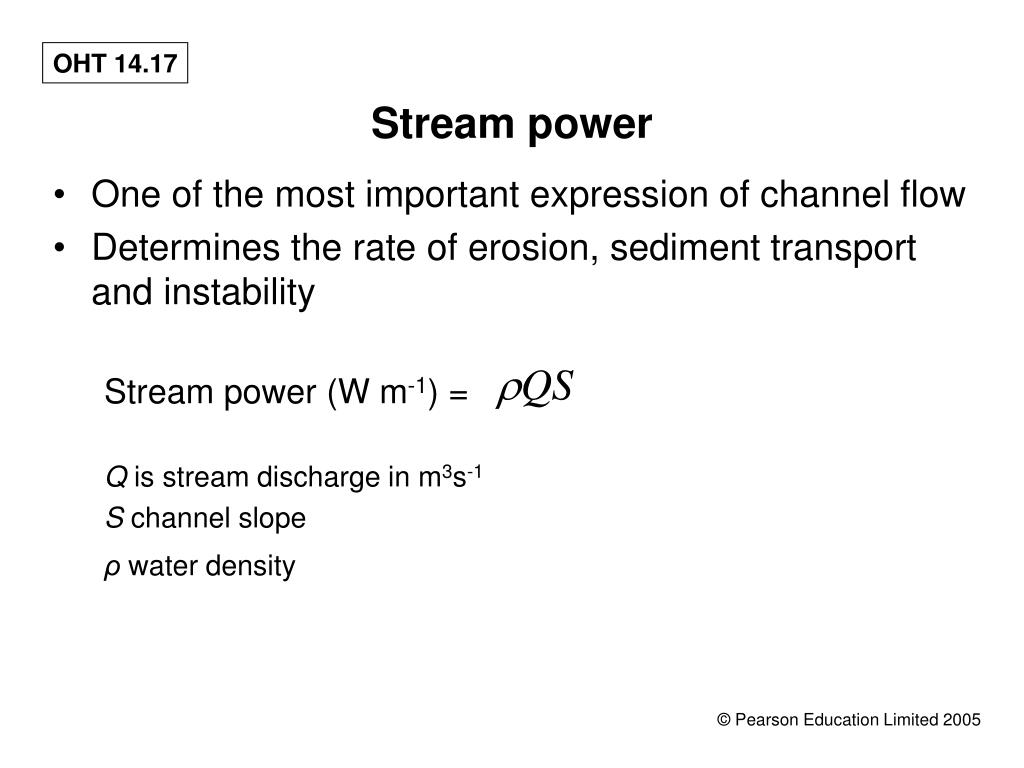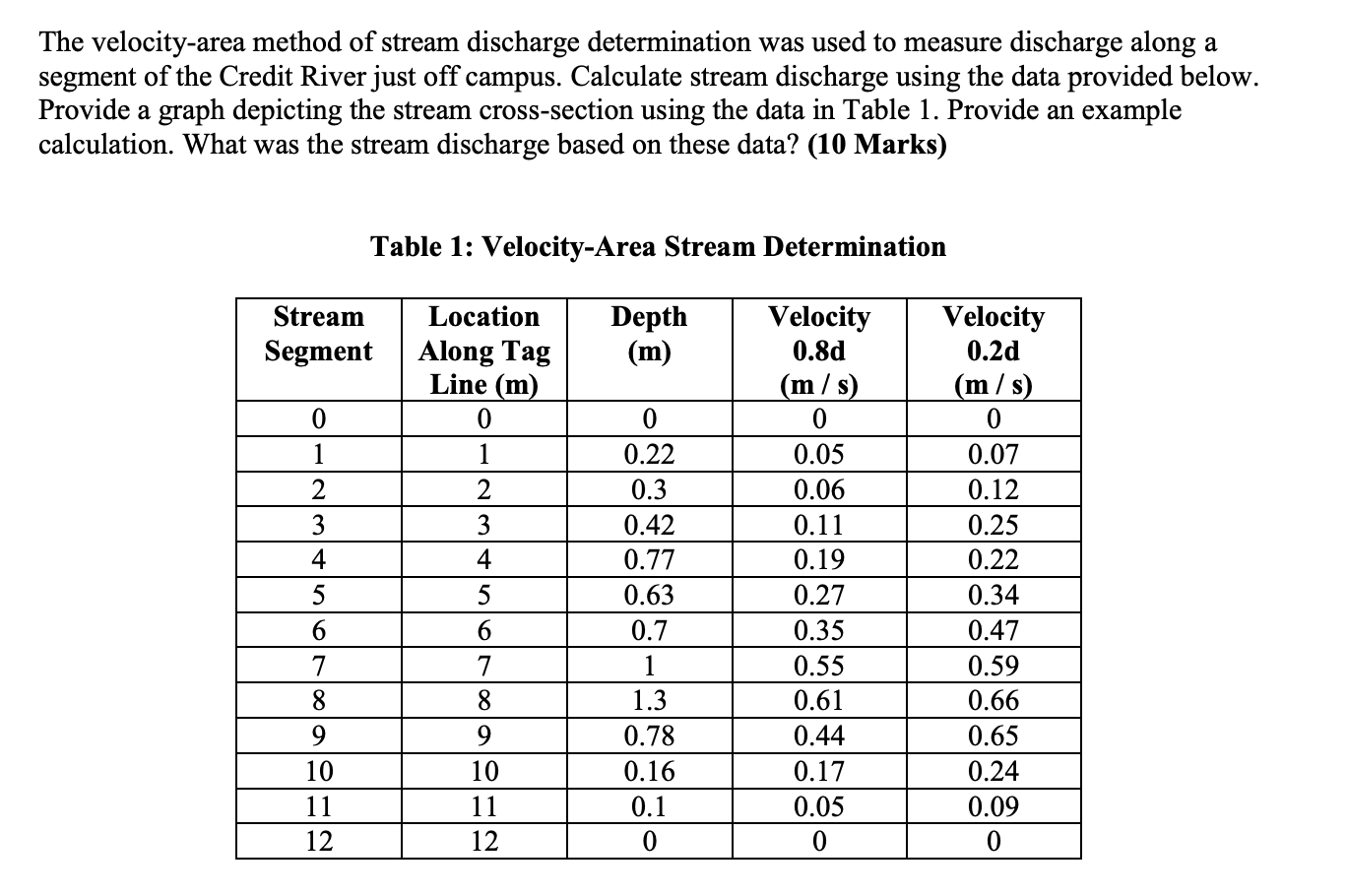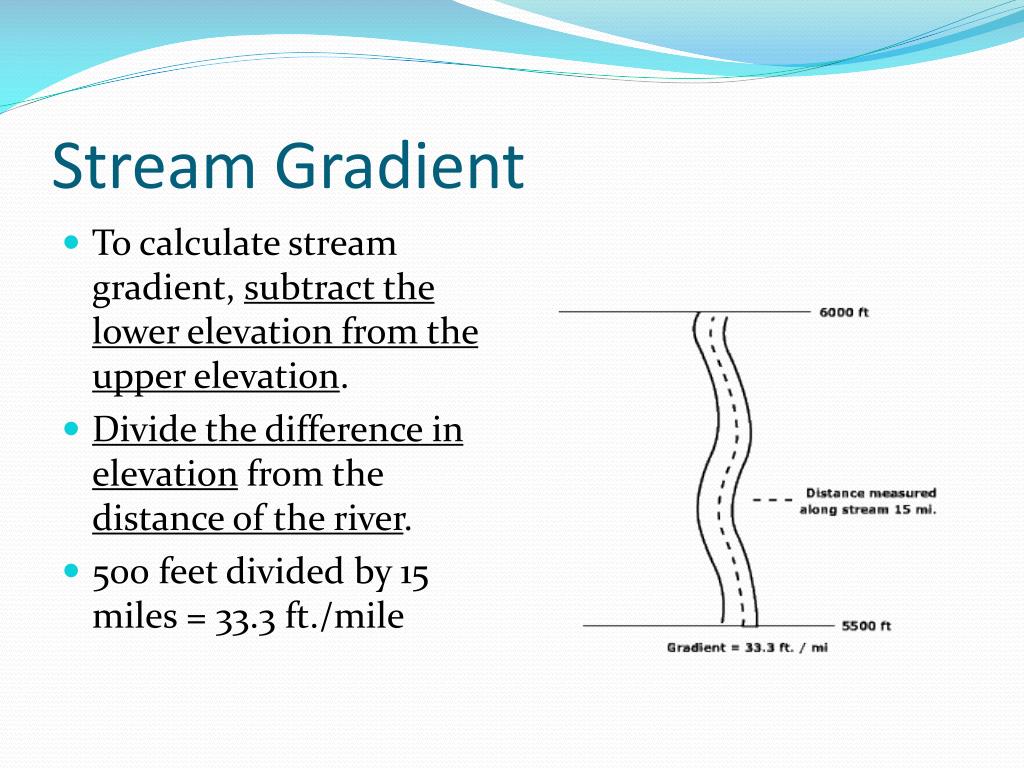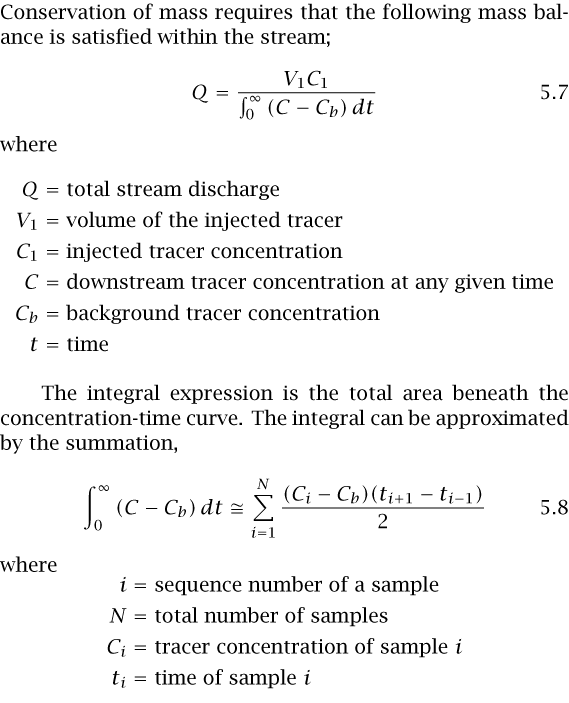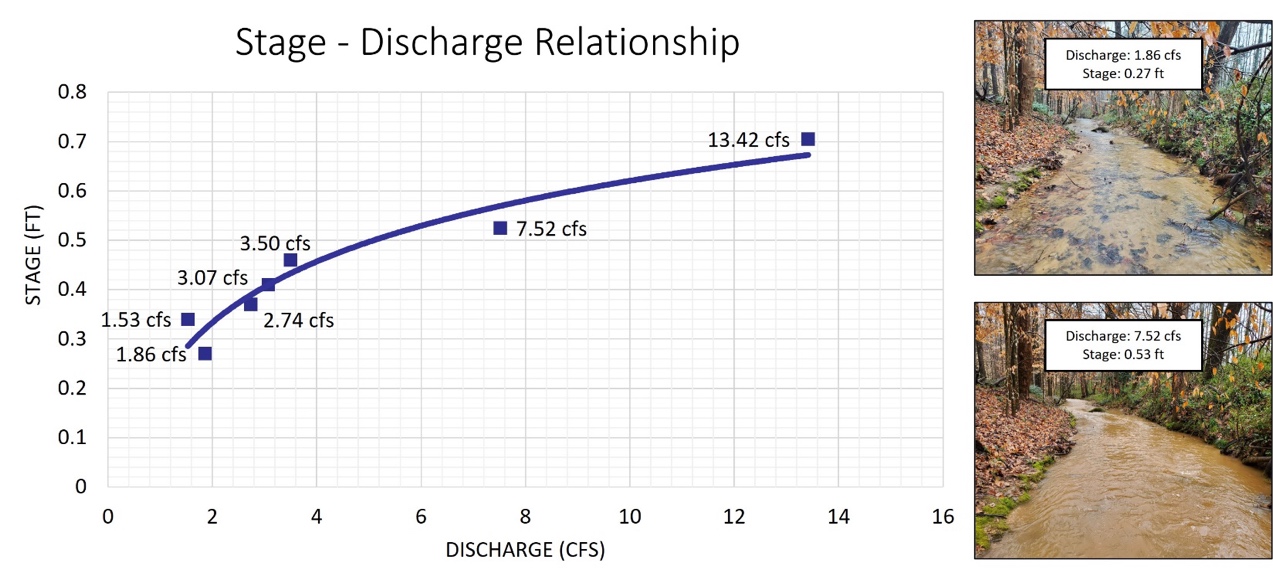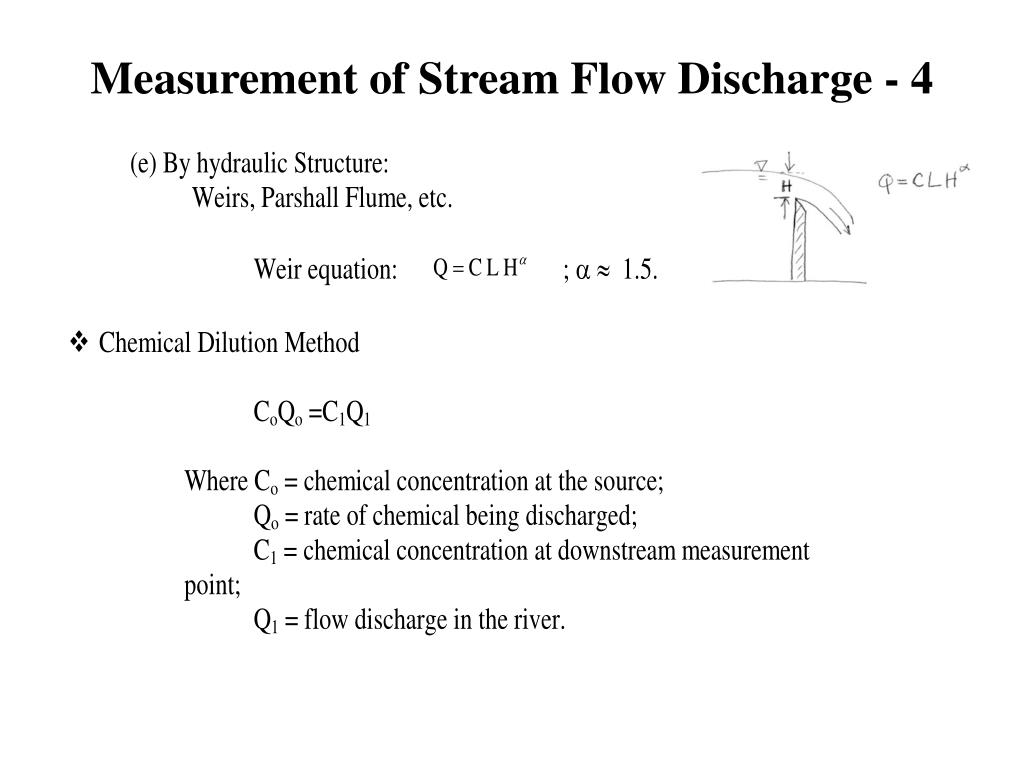Stream Discharge Formula - Generally, discharge q (ft 3 /s or m 3 /s) is calculated as the velocity v (ft/s or m/s) of water moving through a unit area a (ft 2 or m. Q = a x v, where q is the. The four methods of stream gauging to be considered are (i) the area velocity method, (ii) the slope area method, (iii) the weir method. The formula for stream discharge is q = a × v, where q is the discharge (measured in cubic meters per second, m 3 /s), a is the cross. It equals the product of average flow. Stream discharge is typically expressed in cubic meters per second (m 3 /s) and can be calculated using the formula: Measuring stream stage —obtaining a continuous record of stage—the height of the. In hydrology, discharge is the volumetric flow rate (volume per time, in units of m 3 /h or ft 3 /h) of a stream. Streamgaging generally involves 3 steps:
The formula for stream discharge is q = a × v, where q is the discharge (measured in cubic meters per second, m 3 /s), a is the cross. Stream discharge is typically expressed in cubic meters per second (m 3 /s) and can be calculated using the formula: The four methods of stream gauging to be considered are (i) the area velocity method, (ii) the slope area method, (iii) the weir method. Streamgaging generally involves 3 steps: Generally, discharge q (ft 3 /s or m 3 /s) is calculated as the velocity v (ft/s or m/s) of water moving through a unit area a (ft 2 or m. Q = a x v, where q is the. In hydrology, discharge is the volumetric flow rate (volume per time, in units of m 3 /h or ft 3 /h) of a stream. It equals the product of average flow. Measuring stream stage —obtaining a continuous record of stage—the height of the.
The formula for stream discharge is q = a × v, where q is the discharge (measured in cubic meters per second, m 3 /s), a is the cross. In hydrology, discharge is the volumetric flow rate (volume per time, in units of m 3 /h or ft 3 /h) of a stream. It equals the product of average flow. The four methods of stream gauging to be considered are (i) the area velocity method, (ii) the slope area method, (iii) the weir method. Measuring stream stage —obtaining a continuous record of stage—the height of the. Streamgaging generally involves 3 steps: Generally, discharge q (ft 3 /s or m 3 /s) is calculated as the velocity v (ft/s or m/s) of water moving through a unit area a (ft 2 or m. Stream discharge is typically expressed in cubic meters per second (m 3 /s) and can be calculated using the formula: Q = a x v, where q is the.
PPT FLUVIAL GEOMORPHOLOGY PowerPoint Presentation, free download ID
The formula for stream discharge is q = a × v, where q is the discharge (measured in cubic meters per second, m 3 /s), a is the cross. Streamgaging generally involves 3 steps: Q = a x v, where q is the. It equals the product of average flow. In hydrology, discharge is the volumetric flow rate (volume per.
Solved The velocityarea method of stream discharge
Streamgaging generally involves 3 steps: Stream discharge is typically expressed in cubic meters per second (m 3 /s) and can be calculated using the formula: The formula for stream discharge is q = a × v, where q is the discharge (measured in cubic meters per second, m 3 /s), a is the cross. Generally, discharge q (ft 3 /s.
Hydrology Equation of Stream Discharge1 YouTube
The four methods of stream gauging to be considered are (i) the area velocity method, (ii) the slope area method, (iii) the weir method. Measuring stream stage —obtaining a continuous record of stage—the height of the. Generally, discharge q (ft 3 /s or m 3 /s) is calculated as the velocity v (ft/s or m/s) of water moving through a.
PPT Rivers and Streams PowerPoint Presentation, free download ID
It equals the product of average flow. The formula for stream discharge is q = a × v, where q is the discharge (measured in cubic meters per second, m 3 /s), a is the cross. Measuring stream stage —obtaining a continuous record of stage—the height of the. In hydrology, discharge is the volumetric flow rate (volume per time, in.
Measure Stream Discharge Using the Continuity Equation Baugh Hinst1979
In hydrology, discharge is the volumetric flow rate (volume per time, in units of m 3 /h or ft 3 /h) of a stream. Q = a x v, where q is the. Stream discharge is typically expressed in cubic meters per second (m 3 /s) and can be calculated using the formula: The four methods of stream gauging to.
[Solved] Fluvial Geomorphology Calculating Stream Discharge & Stream
Q = a x v, where q is the. Measuring stream stage —obtaining a continuous record of stage—the height of the. The four methods of stream gauging to be considered are (i) the area velocity method, (ii) the slope area method, (iii) the weir method. Generally, discharge q (ft 3 /s or m 3 /s) is calculated as the velocity.
Ch ppt download
Streamgaging generally involves 3 steps: The formula for stream discharge is q = a × v, where q is the discharge (measured in cubic meters per second, m 3 /s), a is the cross. Q = a x v, where q is the. Generally, discharge q (ft 3 /s or m 3 /s) is calculated as the velocity v (ft/s.
Streamflow What is it, and How Do We Measure It? LandGrant Press
Q = a x v, where q is the. The four methods of stream gauging to be considered are (i) the area velocity method, (ii) the slope area method, (iii) the weir method. Measuring stream stage —obtaining a continuous record of stage—the height of the. In hydrology, discharge is the volumetric flow rate (volume per time, in units of m.
PPT STREAMFLOW and HYDROGRAPH ANALYSIS PowerPoint Presentation, free
Q = a x v, where q is the. It equals the product of average flow. Generally, discharge q (ft 3 /s or m 3 /s) is calculated as the velocity v (ft/s or m/s) of water moving through a unit area a (ft 2 or m. Streamgaging generally involves 3 steps: In hydrology, discharge is the volumetric flow rate.
Stream Discharge Formula
The four methods of stream gauging to be considered are (i) the area velocity method, (ii) the slope area method, (iii) the weir method. The formula for stream discharge is q = a × v, where q is the discharge (measured in cubic meters per second, m 3 /s), a is the cross. Streamgaging generally involves 3 steps: Q =.
The Four Methods Of Stream Gauging To Be Considered Are (I) The Area Velocity Method, (Ii) The Slope Area Method, (Iii) The Weir Method.
Measuring stream stage —obtaining a continuous record of stage—the height of the. Q = a x v, where q is the. In hydrology, discharge is the volumetric flow rate (volume per time, in units of m 3 /h or ft 3 /h) of a stream. Streamgaging generally involves 3 steps:
The Formula For Stream Discharge Is Q = A × V, Where Q Is The Discharge (Measured In Cubic Meters Per Second, M 3 /S), A Is The Cross.
Stream discharge is typically expressed in cubic meters per second (m 3 /s) and can be calculated using the formula: Generally, discharge q (ft 3 /s or m 3 /s) is calculated as the velocity v (ft/s or m/s) of water moving through a unit area a (ft 2 or m. It equals the product of average flow.
